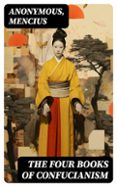THE FOUR BOOKS OF CONFUCIANISM (edición en inglés) de ANONYMOUS, MENCIUS
Ficha técnica
- THE FOUR BOOKS OF CONFUCIANISM (edición en inglés)
- ANONYMOUS, MENCIUS
- Idioma: Inglés
- Formatos: Pdf, ePub, MOBI, FB2
- ISBN: 8596547734819
- Editorial: Digicat
Libros para descargar en ipad mini THE FOUR BOOKS OF CONFUCIANISM (edición en inglés) in Spanish 8596547734819 de ANONYMOUS, MENCIUS
Overview
The Four Books of Confucianism embodies a quintessential collection that navigates through the core philosophical underpinnings and ethical teachings of Confucianism, offering a diverse range of literary styles from didactic dialogues to introspective reflections. This anthology not only serves as a cornerstone for understanding East Asian moral and societal philosophies but also highlights the dynamic interplay of ideas that have shaped Confucian thought over centuries. It is particularly significant for encapsulating the evolution of thought from Confucius himself to his later interpreters, notably Mencius, whose contributions offer a profound depth to the understanding of human nature and righteousness. The diversity and significance of the works within, including the Analects and Mencius, reflect a rich tapestry of historical context and philosophical inquiry. The contributing authors, with Mencius standing out for his eloquent discourses, were instrumental in the proliferation and evolution of Confucian thought. Their backgrounds, spanning from the Warring States period to the early Han dynasty, provide a snapshot of the intellectual and cultural ferment of the times. These texts collectively align with the foundational Confucian values but also explore the elasticity of these concepts in adapting to different historical and cultural contexts. This anthology not only offers a panoramic view of Confucian philosophy but also serves as a testament to the enduring relevance of these teachings. It encourages readers to explore the richness of Confucian thought, providing a unique opportunity to delve into a wealth of perspectives, styles, and themes. As such, this collection is an invaluable resource for anyone interested in the philosophical underpinnings of one of the worlds oldest continuous cultures, promoting a deeper understanding of the interconnections between morality, society, and governance. It fosters a dialogue that is as much about historical exploration as it is about the contemporary relevance of Confucian teachings in navigating the complexities of modern life.

